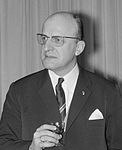From Wikipedia, the free encyclopedia
1961 Belgian general election
First party
Second party
Third party
Leader
Théo Lefèvre
Léo Collard
Roger Motz
Party
Christian Social
Socialist
Liberal
Leader since
Candidate for PM
1959
1958
Last election
104 seats, 46.50%
80 seats, 35.79%
20 seats, 11.05%
Seats won
96
84
20
Seat change
Popular vote
2,182,642
1,933,424
649,376
Percentage
41.46%
36.72%
12.33%
Swing
Fourth party
Fifth party
Sixth party
Leader
Frans Van der Elst
Ernest Burnelle
Jean-Marie Evrard
Party
VU
PVDA-PTB
RN
Leader since
1955
1954
1959
Last election
1 seat, 1.98%
2 seats, 1.89%
New
Seats won
5
5
1
Seat change
New
Popular vote
182,407
162,238
42,450
Percentage
3.46%
3.08%
0.81%
Swing
New
General elections were held in Belgium on 26 March 1961.[1] Christian Social Party , which won 96 of the 212 seats in the Chamber of Representatives and 47 of the 106 seats in the Senate .[2] [3] provincial councils were also held.
Prior to the elections, the centre-right government of the Christian Social and Liberal Party led by Gaston Eyskens pushed through austerity measures with a law known as the Eenheidswet or Loi Unique heavy strikes in the preceding weeks , especially in Wallonia. After the elections, the Christian Democrats formed a new government with the Socialist Party instead of the Liberal Party, with Théo Lefèvre as Prime Minister.
Results Chamber of Deputies
Party
Votes
%
Seats
+/–
Christian Social Party 2,182,642
41.46
96
–8
Belgian Socialist Party 1,933,424
36.72
84
+4
Liberal Party 649,376
12.33
20
0
People's Union 182,407
3.46
5
+4
Communist Party of Belgium 162,238
3.08
5
+3
National Rally 42,450
0.81
1
New
Independent Party
33,174
0.63
0
New
National Union of Independents
12,252
0.23
0
New
National Party
4,375
0.08
0
New
Liberal Dissidents
3,956
0.08
0
New
Walloon Unity
3,466
0.07
0
New
Alleenstaande
3,101
0.06
0
New
Zelfstandig
2,307
0.04
0
New
Francophone Bloc
1,824
0.03
0
New
Gekavemus
604
0.01
0
New
Independent Workers
551
0.01
0
New
Universal People
480
0.01
0
New
EC Group
154
0.00
0
New
Independents
46,244
0.88
1
–
Invalid/blank votes
308,815
–
–
–
Total 5,573,840 100 212 0
Registered voters/turnout
6,036,165
92.34
–
–
Source: Belgian Elections
Senate
Party
Votes
%
Seats
+/–
Christian Social Party 2,200,323
42.12
47
–6
Belgian Socialist Party 1,924,605
36.84
45
+5
Liberal Party 637,922
12.20
11
+1
Communist Party of Belgium 163,576
3.13
1
0
People's Union 159,096
3.05
2
+2
National Movement
26,211
0.65
0
New
Independent Party
21,421
0.41
0
New
National Union of Independents
21,421
0.41
0
New
Liberal Dissidents
7,711
0.15
0
New
National Rally 5,425
0.10
0
New
National Party
4,457
0.09
0
New
Walloon Unity
3,478
0.07
0
New
Francophone Bloc
1,947
0.04
0
New
Independents
36,646
0.70
0
0
Invalid/blank votes
349,475
–
–
–
Total 5,573,982 100 106 0
Registered voters/turnout
6,036,165
92.34
–
–
Source: Belgian Elections
References




